外研版九年级下册Module 8 My future life Unit 3 Language in use课件 (共59张PPT)
文档属性
| 名称 | 外研版九年级下册Module 8 My future life Unit 3 Language in use课件 (共59张PPT) |

|
|
| 格式 | ppt | ||
| 文件大小 | 3.9MB | ||
| 资源类型 | 教案 | ||
| 版本资源 | 外研版 | ||
| 科目 | 英语 | ||
| 更新时间 | 2022-08-20 00:00:00 | ||
图片预览

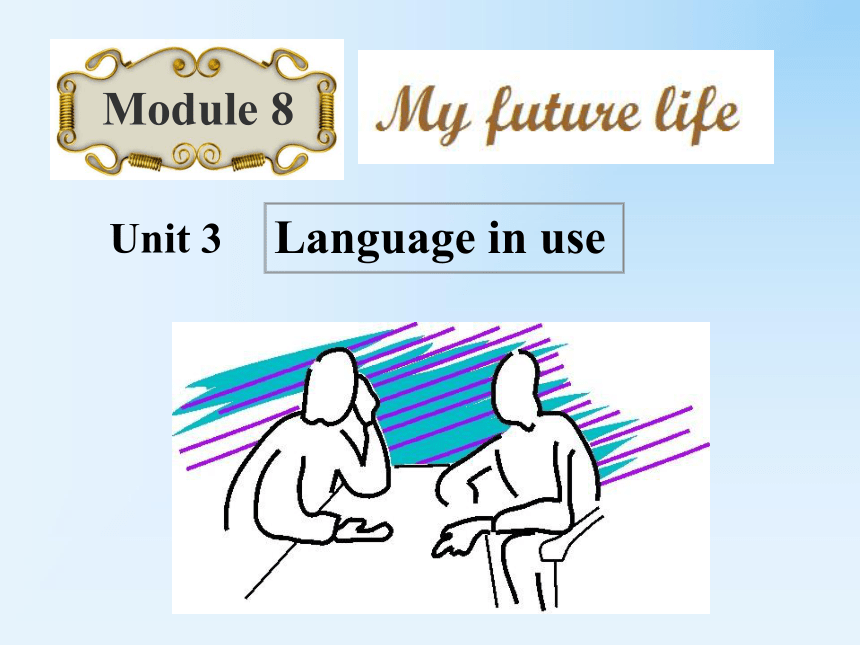
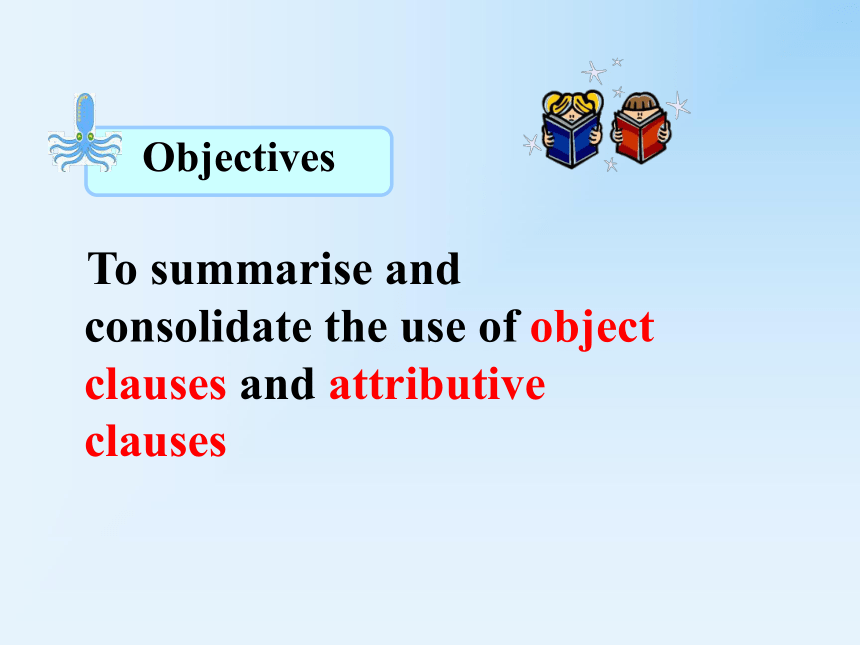
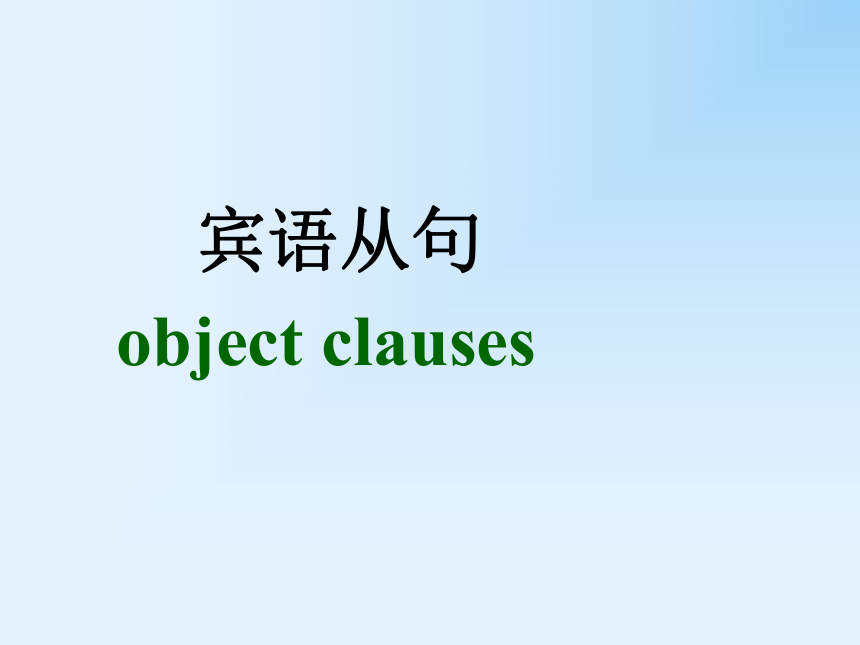
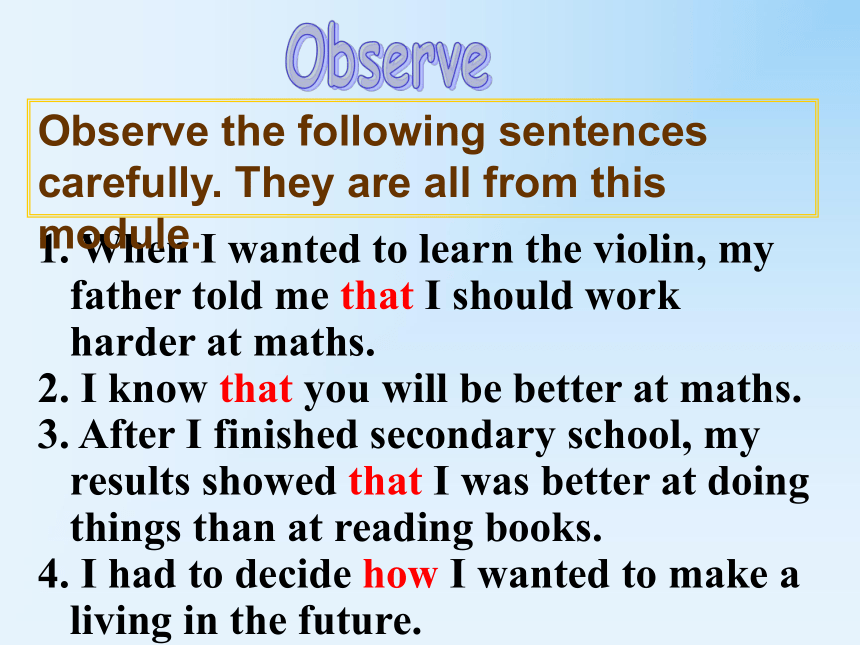
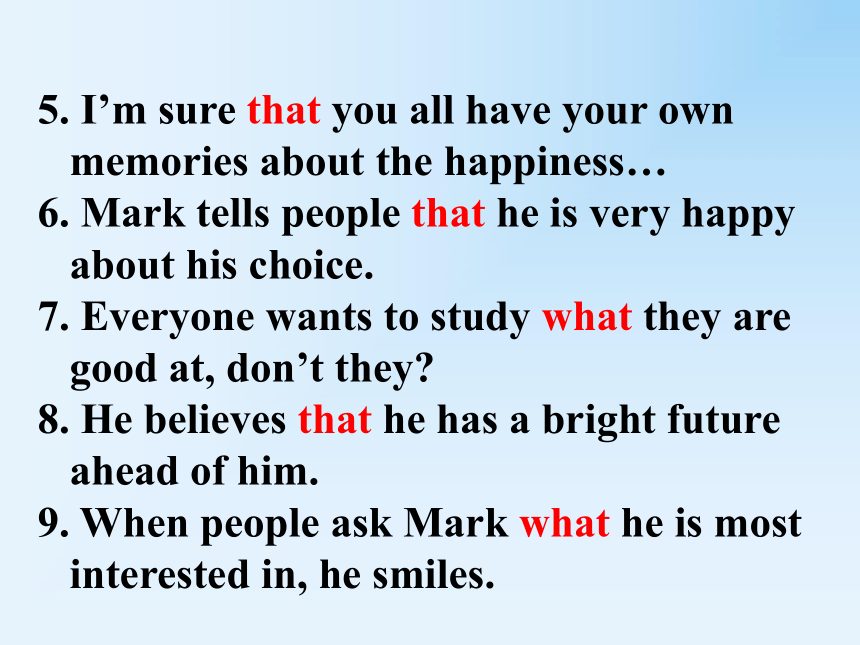

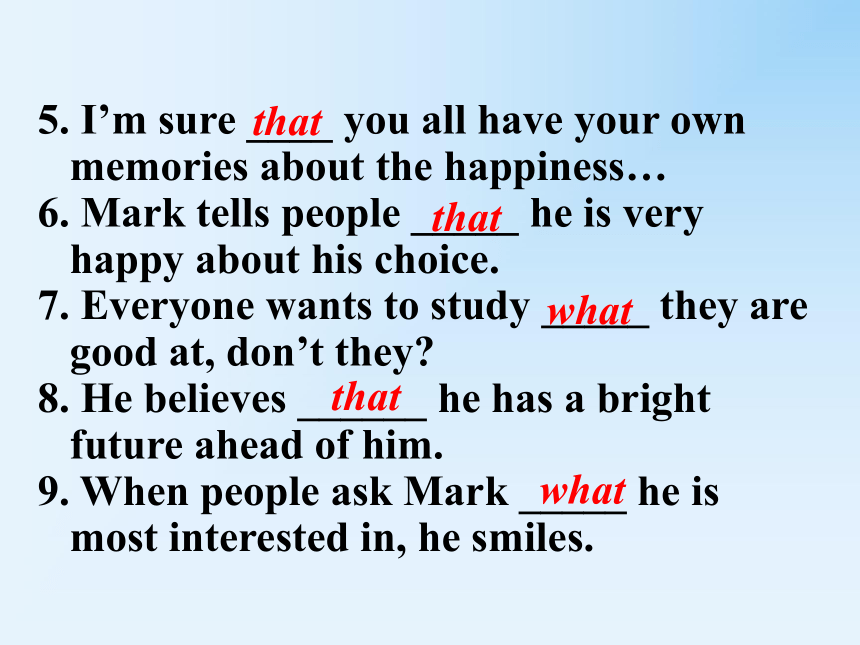

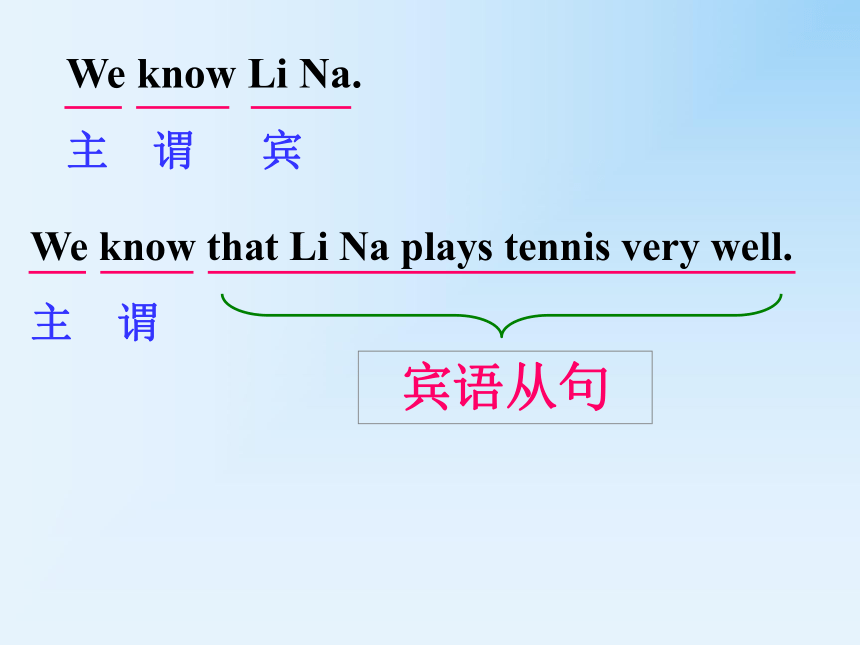
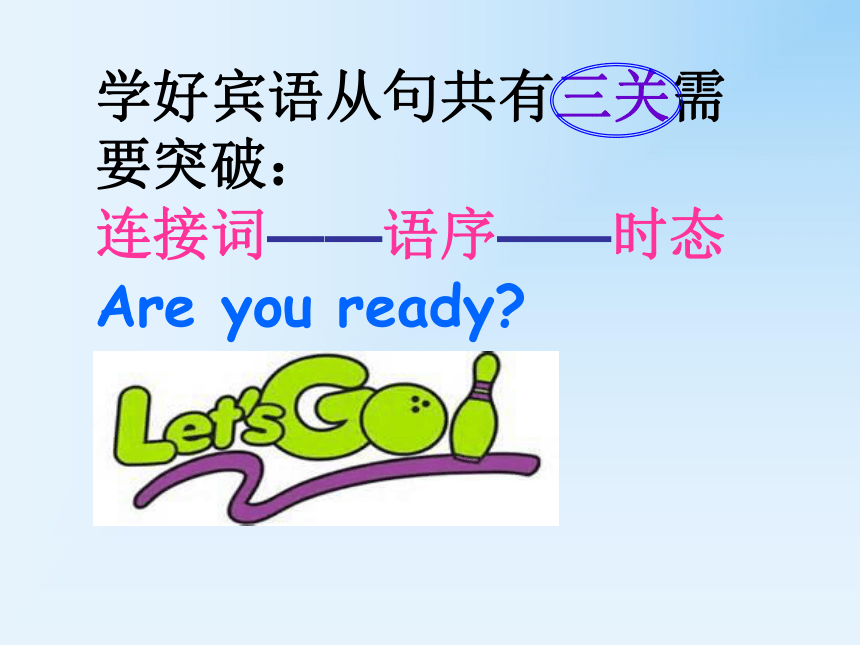
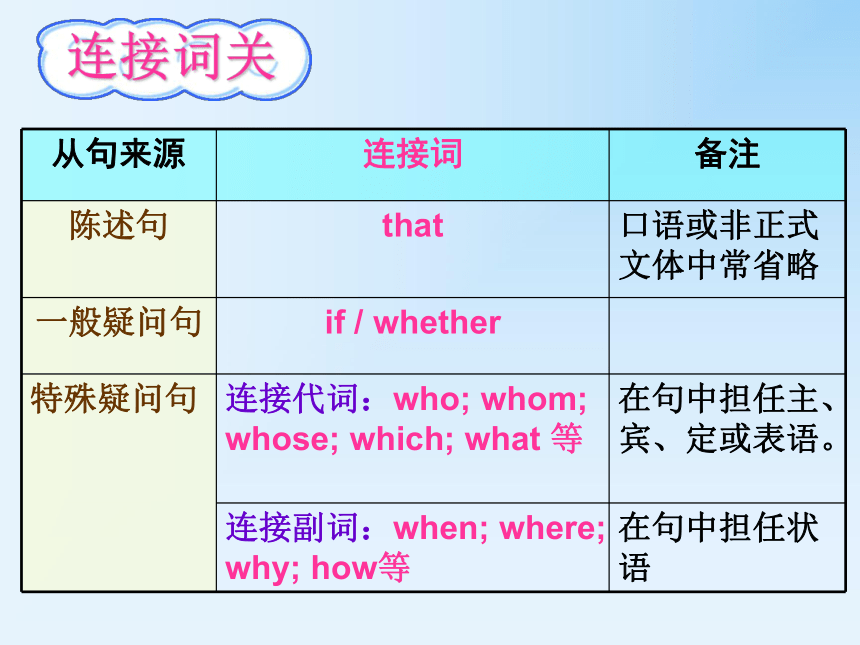
文档简介
(共59张PPT)
外研
九年级 下册
Module 8
Unit 3
Language in use
To summarise and consolidate the use of object clauses and attributive clauses
Objectives
宾语从句
object clauses
1. When I wanted to learn the violin, my father told me that I should work harder at maths.
2. I know that you will be better at maths.
3. After I finished secondary school, my results showed that I was better at doing things than at reading books.
4. I had to decide how I wanted to make a living in the future.
Observe the following sentences carefully. They are all from this module.
5. I’m sure that you all have your own memories about the happiness…
6. Mark tells people that he is very happy about his choice.
7. Everyone wants to study what they are good at, don’t they
8. He believes that he has a bright future ahead of him.
9. When people ask Mark what he is most interested in, he smiles.
that
that
1. When I wanted to learn the violin, my father told me ______ I should work harder at maths.
2. I know ______ you will be better at maths.
3. After I finished secondary school, my results showed ______ I was better at doing things than at reading books.
4. I had to decide _____ I wanted to make a living in the future.
that
go
Ready
how
5. I’m sure ____ you all have your own memories about the happiness…
6. Mark tells people _____ he is very happy about his choice.
7. Everyone wants to study _____ they are good at, don’t they
8. He believes ______ he has a bright future ahead of him.
9. When people ask Mark _____ he is most interested in, he smiles.
that
that
what
that
what
在复合句中,如作宾语的是一个从句,该从句被称为宾语从句。
We know Li Na.
主 谓 宾
We know that Li Na plays tennis very well.
主 谓
宾语从句
学好宾语从句共有三关需要突破:
连接词——语序——时态
Are you ready
连接词关
从句来源 连接词 备注
陈述句
that 口语或非正式文体中常省略
一般疑问句 if / whether
特殊疑问句 连接代词:who; whom; whose; which; what 等 在句中担任主、宾、定或表语。
连接副词:when; where; why; how等 在句中担任状语
that连接的宾语从句,用来陈述一件事或表达一种感情等,由陈述句转化而来。
1. He says (that) he is listening to the weather report.
2. I know that foreigners find China very different from their own countries.
3. I’m afraid (that) he can’t come.
4. She asked us to imagine that we were in a story.
if或whether连接的宾语从句,由一般疑问句转化而来,常放在ask, see, know,
wonder, find out等动词/组后面。常可换用,口语中多用if。
1. The old woman asked me if I knew the way to the hospital.
2. - Is Peter there - Hold on, please. I'll see if I can find him for you. 3. Nobody knows whether/if it will rain tomorrow.
4. He wondered if /whether he had given correct answers.
5. I’d like to find out whether I am blacklisted.
连接代词和连接副词引导的宾语从句是由特殊疑问句变化而来,要用陈述句语序。常放在:see, say, tell, ask, answer, know, decide, find out, imagine, suggest, wonder, discover, understand, inform, advise等动词/组后面。
1. They haven’t decided who will go there.
2. I want to know whom/who you are waiting for
3. Tell me what book you like to read. 4. Tell me which book you like to read best of the three.
5. Have the police discovered whose the special shoes are
1. I asked him why he smiled.
2. Can you tell me where you are?
3. Do you know when we will hold the sports meeting
4. I can’t imagine how the thief entered my room.
连接代词和连接副词引导的宾语从句是由特殊疑问句变化而来,要用陈述句语序。常放在:see, say, tell, ask, answer, know, decide, find out, imagine, suggest, wonder, discover, understand, inform, advise等动词/组后面。
宾语从句用陈述语序。如:
He is an honest boy. The teacher said.
→The teacher said (that) he was an honest boy.
Does he work hard?I wonder.
→I wonder if/whether he works hard.
When did he leave?I don’t know.
→I don’t know when he left.
语序关
①主句是现在的时态,从句的时态可根据实际情况而定。如:
I hear that she has written three letters to the headmaster.
Mr Green says that the snow was very heavy last month.
时态关
②主句是过去的某种时态,
从句一定要用过去的某种时态。
主句时态 从句时态
一般现在时 一般过去时
一般过去时 过去完成时
现在进行时 过去进行时
一般将来时 过去将来时
现在完成时 过去完成时
过去进行时 过去进行时
如:We didn’t know why she had missed
the flight.
He told me that he was watching a
cartoon film at 10 o’clock this morning.
注意:如果宾语从句表述的是客观真理、自然现象等时,不管主句是什么时态,
从句都要用一般现在时。如:
He said that light travels much faster
than sound.
过了三关是不是顿时轻松了呢?
千万别掉以轻心,还有一点需要提醒:有些词有“两副面孔”,见到了要注意区分。
if和when既能引导时间状语从句,又能引导宾语从句。因此,遇到它们就要认真分析一下,它们究竟属于“两副面孔”的哪一副。如:
If it rains tomorrow, I won’t come.
(时间状语从句)
I don’t know if it will rain tomorrow.
(宾语从句)
如果
是否
宾语从句三要素:
连接词 that(陈述句)
if/whether(一般疑问句)
who; whom; whose; which; what
when; where; why; how(特殊疑问句)
时态 主句为一般现在时,
从句可以是任何时态
主句为一般过去时,
从句进行相应的变化
客观真理,自然现象等不变
语序 陈述语序
定语从句
attributive clauses
1. These roses are to … for the three most important things that I have learnt.
2. I give the white rose to my teachers, who have taught me that there is no success without effort.
3. I am sure that you all have your own memories … and the people whom you want to thank for it.
4. Mark Smith is a student at a vocational school – a school where people learn...
Observe the following sentences carefully. They are all from this module.
5. I’m the sort of person who is good at making things with my hands.
6. Everyone needs a skill that is useful if they want a good life.
7. Now I study the things that I like best.
8. You can’t have a society where everyone works in an office.
9. Workers who can make things and repair things will always be needed.
1. These roses are to … for the three most important things _____ I have learnt.
2. I give the white rose to my teachers, _____ have taught me that there is no success without effort.
3. I am sure that you all have your own memories … and the people ______ you want to thank for it.
4. Mark Smith is a student at a vocational school – a school ______ people learn...
that
who
whom
where
go
Ready
5. I’m the sort of person _____ is good at making things with my hands.
6. Everyone needs a skill _____ is useful if they want a good life.
7. Now I study the things ____ I like best.
8. You can’t have a society ______ everyone works in an office.
9. Workers _____ can make things and repair things will always be needed.
who
that
that
where
who
在复合句中,如作定语的是一个从句,该从句被称为定语从句。
先行词:是被定语从句所修饰的词 (通常是名词或代词)
关系词的作用:
1.引导定语从句
2.在从句中替代先行词,在定语从句中充当一定的成分,通常是主语或宾语,作宾语时常可以省略。
定语从句:
先行词+关系词(that/which/who)+从句
修饰
先行词 关系词
指人 that (作主语、宾语或表语)
who (作主语、宾语或表语)
whom (作宾语)
指物 that (作主语、宾语或表语)
which (作主语或宾语)
有时可代替whom作宾语
Who is the girl that talked to you yesterday.
Attributive clause
关系词在从
句中做主语
先行词是人
Look at the photos (that) I took on my trip.
Attributive clause
关系词在从句中作宾语
先行词是物
It successfully shows the rich culture
which makes Beijing so famous.
Attributive clause
关系词在从
句中作主语
先行词是物
The photo (which) we liked best was
taken by Zhao Min.
Attributive clause
先行词是物
关系词在从句中作宾语
His father is the person who will be
most unhappy.
Attributive clause
先行词是人
关系词在从句中作主语
Tom is the boy (who/whom) we saw in the shop.
Attributive clause
先行词是人
关系词在从句中作宾语
在先行词是物的定语从句中,一般情
况下that和which都可以通用, 但在下
列情况下, 一般用that而不用which。
I am sure she has something that you can borrow.
1.先行词为all, everything, nothing, something, anything, little, much 等不定代词时。
I’ve read all the books that are not mine.
2. 先行词被all, little, much, every, no 等修饰时。
3. 先行词被序数词或最高级修饰时。
This is the first book that he has read.
E.g:This is the very book that belongs to him.
4. 先行词被the only, the very, the same,
the last修饰时。
5. 先行词为人和物的组合。
E.g:They talked for an hour of things and persons that they remembered in the school.
E.g: Which of the books that you borrowed from the library is the most interesting
6. 若主句中有疑问代词who或者which,
为了避免重复, 关系代词不要再用who,
which,而用that。
以下部分为课本练习,供老师在对答案时选择使用。
1. Complete the sentences using which, that, who or whom. Try to explain the meaning of the words in bold.
1. Finger food is the food
that/which we eat with our fingers.
2. A handbag is a small bag
__________________________________
3. School-leavers are young people
______________________
4. A classmate is someone
____________________________
5. A friend is someone _________.
6. A stranger is someone __________________.
which women use to carry their things.
who are leaving school.
who is in the same class as me.
I trust
whom I don’t know
P68 1
2. Work in pairs. Look at the picture and the menu. Discuss the questions.
P68 2
Possible answers
I think the party is international because the food is international.
I think the people are cheering because they are happy about what the speaker is saying.
I think the speaker is saying that now the speech is over and it is time to eat!
3. Complete the passage with the clauses in the box.
a
e
b
c
d
P69 3
4. Join the words in Box A with the words in Box B to make new words. You need to use one word more than once.
after class hair hand
bag cut made mate noon
A
B
afternoon, classmate, haircut, handbag, handmade
P69 4
Now complete the conversation with the new words.
What are you going to wear to the school-leavers’ party
I’m going to wear a dress. And I’m going to buy a new black __________. Do you want to go with me to the shopping centre to look for one
Sorry, I can’t. I’m having a(n) _________ this ___________ at three O’clock. I want nice short hair for the party!
Lingling:
Betty:
Lingling:
handbag
haircut
afternoon
I’ll go with you, Betty. I’m going to take photos, and I want to buy a book to put photos in. I hope that all of us will remember each other. I’m happy I have been your _________.
I’ve already bought a special book for the photos. It’s black, with _________ paper pages.
You can carry it on the big night, then. It’ll match your clothes.
Don’t be silly, Tony!
Tony:
Betty:
Betty:
Tony:
classmate
handmade
5. Complete the sentences with the words or expressions in the box.
beat laugh at pardon roses wake…up
1. Try to follow the _________ of the music.
2. Oh, __________ me. I didn’t see you there.
3. We’re going to put ________ all around the room this year.
4. I can’t go to school wearing that – everyone will __________ me.
5. I’ll _______ you _____ when it’s time to leave.
beat
pardon
roses
laugh at
wake
up
P70 5
6. Listen and answer the questions.
P70 6
Possible answers
1. Adam went to Africa.
2. He helped to build a primary school.
3. The people were very friendly.
4. He visited the beaches.
5. He wants to go to college and maybe become a teacher.
7. Read the passage and choose the correct answer.
b
c
d
P71 7
1. -Do you know _____
-For a month. (2015天津)
A. how long will she be away
B. how long she will be away
C. how often will she go there
D. how often she will go there
Choose the best answer.
2.The stories _____ were written by Mark Twain are often humorous. (2015广州)
A. that B. those
C. who D. what
3. “Underground” is the only word in the English language _______ begins and ends with the letters “und”. (2014河南) A. what B. that
C. who D. whom
4. —Where is the School English Speech Contest going to be held tonight
—I’m not sure. Is it in the hall _____ can hold 300 people (2014鄂州 )
A. where B. what
C. that D. when
5. Do you know the man______ saved five people in the fire (2014宜宾 )
A. who B. it
C. when D. whom
6. I really like the photo of my family _____ my sister took in the city park last year. A. which B. who
C. what D. whom
7. People ______ overweight need more water than thin people. (2014呼和浩特 )
A. who is B. which are
C. that is D. who are
8. —In a text message, 88 means Bye-bye. —And another example is F2F ______ stands for face to face. (2014黄冈)
A. that B. who
C. whom D. it
9. —Jack, could you tell me _____ for travelling this summer —We plan to go and see the beautiful sea in Hainan. (2014连云港 )
A. where your family will go
B. how will your family go C. how your family will go
D. where will your family go
10. —Mum, summer holiday is coming. I wonder ____ . —How about Qinling Wild Zoo? (2014陕西)
A. where can we go
B. where we can go C. how we can go
D. how we can go
Finish the exercises in Learning English.
Homework
外研
九年级 下册
Module 8
Unit 3
Language in use
To summarise and consolidate the use of object clauses and attributive clauses
Objectives
宾语从句
object clauses
1. When I wanted to learn the violin, my father told me that I should work harder at maths.
2. I know that you will be better at maths.
3. After I finished secondary school, my results showed that I was better at doing things than at reading books.
4. I had to decide how I wanted to make a living in the future.
Observe the following sentences carefully. They are all from this module.
5. I’m sure that you all have your own memories about the happiness…
6. Mark tells people that he is very happy about his choice.
7. Everyone wants to study what they are good at, don’t they
8. He believes that he has a bright future ahead of him.
9. When people ask Mark what he is most interested in, he smiles.
that
that
1. When I wanted to learn the violin, my father told me ______ I should work harder at maths.
2. I know ______ you will be better at maths.
3. After I finished secondary school, my results showed ______ I was better at doing things than at reading books.
4. I had to decide _____ I wanted to make a living in the future.
that
go
Ready
how
5. I’m sure ____ you all have your own memories about the happiness…
6. Mark tells people _____ he is very happy about his choice.
7. Everyone wants to study _____ they are good at, don’t they
8. He believes ______ he has a bright future ahead of him.
9. When people ask Mark _____ he is most interested in, he smiles.
that
that
what
that
what
在复合句中,如作宾语的是一个从句,该从句被称为宾语从句。
We know Li Na.
主 谓 宾
We know that Li Na plays tennis very well.
主 谓
宾语从句
学好宾语从句共有三关需要突破:
连接词——语序——时态
Are you ready
连接词关
从句来源 连接词 备注
陈述句
that 口语或非正式文体中常省略
一般疑问句 if / whether
特殊疑问句 连接代词:who; whom; whose; which; what 等 在句中担任主、宾、定或表语。
连接副词:when; where; why; how等 在句中担任状语
that连接的宾语从句,用来陈述一件事或表达一种感情等,由陈述句转化而来。
1. He says (that) he is listening to the weather report.
2. I know that foreigners find China very different from their own countries.
3. I’m afraid (that) he can’t come.
4. She asked us to imagine that we were in a story.
if或whether连接的宾语从句,由一般疑问句转化而来,常放在ask, see, know,
wonder, find out等动词/组后面。常可换用,口语中多用if。
1. The old woman asked me if I knew the way to the hospital.
2. - Is Peter there - Hold on, please. I'll see if I can find him for you. 3. Nobody knows whether/if it will rain tomorrow.
4. He wondered if /whether he had given correct answers.
5. I’d like to find out whether I am blacklisted.
连接代词和连接副词引导的宾语从句是由特殊疑问句变化而来,要用陈述句语序。常放在:see, say, tell, ask, answer, know, decide, find out, imagine, suggest, wonder, discover, understand, inform, advise等动词/组后面。
1. They haven’t decided who will go there.
2. I want to know whom/who you are waiting for
3. Tell me what book you like to read. 4. Tell me which book you like to read best of the three.
5. Have the police discovered whose the special shoes are
1. I asked him why he smiled.
2. Can you tell me where you are?
3. Do you know when we will hold the sports meeting
4. I can’t imagine how the thief entered my room.
连接代词和连接副词引导的宾语从句是由特殊疑问句变化而来,要用陈述句语序。常放在:see, say, tell, ask, answer, know, decide, find out, imagine, suggest, wonder, discover, understand, inform, advise等动词/组后面。
宾语从句用陈述语序。如:
He is an honest boy. The teacher said.
→The teacher said (that) he was an honest boy.
Does he work hard?I wonder.
→I wonder if/whether he works hard.
When did he leave?I don’t know.
→I don’t know when he left.
语序关
①主句是现在的时态,从句的时态可根据实际情况而定。如:
I hear that she has written three letters to the headmaster.
Mr Green says that the snow was very heavy last month.
时态关
②主句是过去的某种时态,
从句一定要用过去的某种时态。
主句时态 从句时态
一般现在时 一般过去时
一般过去时 过去完成时
现在进行时 过去进行时
一般将来时 过去将来时
现在完成时 过去完成时
过去进行时 过去进行时
如:We didn’t know why she had missed
the flight.
He told me that he was watching a
cartoon film at 10 o’clock this morning.
注意:如果宾语从句表述的是客观真理、自然现象等时,不管主句是什么时态,
从句都要用一般现在时。如:
He said that light travels much faster
than sound.
过了三关是不是顿时轻松了呢?
千万别掉以轻心,还有一点需要提醒:有些词有“两副面孔”,见到了要注意区分。
if和when既能引导时间状语从句,又能引导宾语从句。因此,遇到它们就要认真分析一下,它们究竟属于“两副面孔”的哪一副。如:
If it rains tomorrow, I won’t come.
(时间状语从句)
I don’t know if it will rain tomorrow.
(宾语从句)
如果
是否
宾语从句三要素:
连接词 that(陈述句)
if/whether(一般疑问句)
who; whom; whose; which; what
when; where; why; how(特殊疑问句)
时态 主句为一般现在时,
从句可以是任何时态
主句为一般过去时,
从句进行相应的变化
客观真理,自然现象等不变
语序 陈述语序
定语从句
attributive clauses
1. These roses are to … for the three most important things that I have learnt.
2. I give the white rose to my teachers, who have taught me that there is no success without effort.
3. I am sure that you all have your own memories … and the people whom you want to thank for it.
4. Mark Smith is a student at a vocational school – a school where people learn...
Observe the following sentences carefully. They are all from this module.
5. I’m the sort of person who is good at making things with my hands.
6. Everyone needs a skill that is useful if they want a good life.
7. Now I study the things that I like best.
8. You can’t have a society where everyone works in an office.
9. Workers who can make things and repair things will always be needed.
1. These roses are to … for the three most important things _____ I have learnt.
2. I give the white rose to my teachers, _____ have taught me that there is no success without effort.
3. I am sure that you all have your own memories … and the people ______ you want to thank for it.
4. Mark Smith is a student at a vocational school – a school ______ people learn...
that
who
whom
where
go
Ready
5. I’m the sort of person _____ is good at making things with my hands.
6. Everyone needs a skill _____ is useful if they want a good life.
7. Now I study the things ____ I like best.
8. You can’t have a society ______ everyone works in an office.
9. Workers _____ can make things and repair things will always be needed.
who
that
that
where
who
在复合句中,如作定语的是一个从句,该从句被称为定语从句。
先行词:是被定语从句所修饰的词 (通常是名词或代词)
关系词的作用:
1.引导定语从句
2.在从句中替代先行词,在定语从句中充当一定的成分,通常是主语或宾语,作宾语时常可以省略。
定语从句:
先行词+关系词(that/which/who)+从句
修饰
先行词 关系词
指人 that (作主语、宾语或表语)
who (作主语、宾语或表语)
whom (作宾语)
指物 that (作主语、宾语或表语)
which (作主语或宾语)
有时可代替whom作宾语
Who is the girl that talked to you yesterday.
Attributive clause
关系词在从
句中做主语
先行词是人
Look at the photos (that) I took on my trip.
Attributive clause
关系词在从句中作宾语
先行词是物
It successfully shows the rich culture
which makes Beijing so famous.
Attributive clause
关系词在从
句中作主语
先行词是物
The photo (which) we liked best was
taken by Zhao Min.
Attributive clause
先行词是物
关系词在从句中作宾语
His father is the person who will be
most unhappy.
Attributive clause
先行词是人
关系词在从句中作主语
Tom is the boy (who/whom) we saw in the shop.
Attributive clause
先行词是人
关系词在从句中作宾语
在先行词是物的定语从句中,一般情
况下that和which都可以通用, 但在下
列情况下, 一般用that而不用which。
I am sure she has something that you can borrow.
1.先行词为all, everything, nothing, something, anything, little, much 等不定代词时。
I’ve read all the books that are not mine.
2. 先行词被all, little, much, every, no 等修饰时。
3. 先行词被序数词或最高级修饰时。
This is the first book that he has read.
E.g:This is the very book that belongs to him.
4. 先行词被the only, the very, the same,
the last修饰时。
5. 先行词为人和物的组合。
E.g:They talked for an hour of things and persons that they remembered in the school.
E.g: Which of the books that you borrowed from the library is the most interesting
6. 若主句中有疑问代词who或者which,
为了避免重复, 关系代词不要再用who,
which,而用that。
以下部分为课本练习,供老师在对答案时选择使用。
1. Complete the sentences using which, that, who or whom. Try to explain the meaning of the words in bold.
1. Finger food is the food
that/which we eat with our fingers.
2. A handbag is a small bag
__________________________________
3. School-leavers are young people
______________________
4. A classmate is someone
____________________________
5. A friend is someone _________.
6. A stranger is someone __________________.
which women use to carry their things.
who are leaving school.
who is in the same class as me.
I trust
whom I don’t know
P68 1
2. Work in pairs. Look at the picture and the menu. Discuss the questions.
P68 2
Possible answers
I think the party is international because the food is international.
I think the people are cheering because they are happy about what the speaker is saying.
I think the speaker is saying that now the speech is over and it is time to eat!
3. Complete the passage with the clauses in the box.
a
e
b
c
d
P69 3
4. Join the words in Box A with the words in Box B to make new words. You need to use one word more than once.
after class hair hand
bag cut made mate noon
A
B
afternoon, classmate, haircut, handbag, handmade
P69 4
Now complete the conversation with the new words.
What are you going to wear to the school-leavers’ party
I’m going to wear a dress. And I’m going to buy a new black __________. Do you want to go with me to the shopping centre to look for one
Sorry, I can’t. I’m having a(n) _________ this ___________ at three O’clock. I want nice short hair for the party!
Lingling:
Betty:
Lingling:
handbag
haircut
afternoon
I’ll go with you, Betty. I’m going to take photos, and I want to buy a book to put photos in. I hope that all of us will remember each other. I’m happy I have been your _________.
I’ve already bought a special book for the photos. It’s black, with _________ paper pages.
You can carry it on the big night, then. It’ll match your clothes.
Don’t be silly, Tony!
Tony:
Betty:
Betty:
Tony:
classmate
handmade
5. Complete the sentences with the words or expressions in the box.
beat laugh at pardon roses wake…up
1. Try to follow the _________ of the music.
2. Oh, __________ me. I didn’t see you there.
3. We’re going to put ________ all around the room this year.
4. I can’t go to school wearing that – everyone will __________ me.
5. I’ll _______ you _____ when it’s time to leave.
beat
pardon
roses
laugh at
wake
up
P70 5
6. Listen and answer the questions.
P70 6
Possible answers
1. Adam went to Africa.
2. He helped to build a primary school.
3. The people were very friendly.
4. He visited the beaches.
5. He wants to go to college and maybe become a teacher.
7. Read the passage and choose the correct answer.
b
c
d
P71 7
1. -Do you know _____
-For a month. (2015天津)
A. how long will she be away
B. how long she will be away
C. how often will she go there
D. how often she will go there
Choose the best answer.
2.The stories _____ were written by Mark Twain are often humorous. (2015广州)
A. that B. those
C. who D. what
3. “Underground” is the only word in the English language _______ begins and ends with the letters “und”. (2014河南) A. what B. that
C. who D. whom
4. —Where is the School English Speech Contest going to be held tonight
—I’m not sure. Is it in the hall _____ can hold 300 people (2014鄂州 )
A. where B. what
C. that D. when
5. Do you know the man______ saved five people in the fire (2014宜宾 )
A. who B. it
C. when D. whom
6. I really like the photo of my family _____ my sister took in the city park last year. A. which B. who
C. what D. whom
7. People ______ overweight need more water than thin people. (2014呼和浩特 )
A. who is B. which are
C. that is D. who are
8. —In a text message, 88 means Bye-bye. —And another example is F2F ______ stands for face to face. (2014黄冈)
A. that B. who
C. whom D. it
9. —Jack, could you tell me _____ for travelling this summer —We plan to go and see the beautiful sea in Hainan. (2014连云港 )
A. where your family will go
B. how will your family go C. how your family will go
D. where will your family go
10. —Mum, summer holiday is coming. I wonder ____ . —How about Qinling Wild Zoo? (2014陕西)
A. where can we go
B. where we can go C. how we can go
D. how we can go
Finish the exercises in Learning English.
Homework
同课章节目录
- Module 1 Travel
- Unit 1 We toured the city by bus and by taxi
- Unit 2 It's a long story.
- Unit 3 Language in use
- Module 2 Education
- Unit 1 They don't sit in rows.
- Unit 2 What do I like best about school?
- Unit 3 Language in use
- Module 3 Life now and then
- Unit 1 They sometimes work harder.
- Unit 2 I think life is better today.
- Unit 3 Language in use.
- Module 4 Rules and suggestions
- Unit 1 You must be careful of falling stones.
- Unit 2 we must keep the camp clean.
- Unit 3 Language in use.
- Revison A
- Module 5 Look after yourself
- Unit 1 We'd better get you to hospital.
- Unit 2 Get off the sofa!
- Unit 3 Language in use.
- Module 6 Eating togethe
- Unit 1 When is the school-leavers' party?
- Unit 2 Knives and forks are used for most Western
- Unit 3 Language in use
- Module 7 English for you and me
- Unit 1 Have you ever been to an English corner?
- Unit 2 We all own English.
- Unit 3 Language in use
- Module 8 My future life
- Unit 1 Here's to our friendship and the future
- Unit 2 I know that you will be better at maths.
- Unit 3 Language in use
- Revison B
